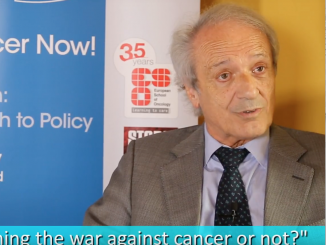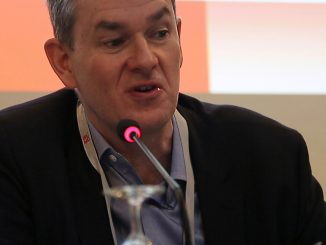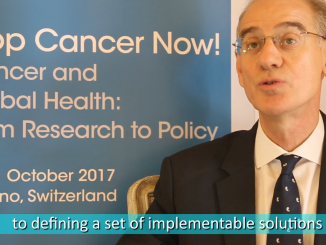At some point in this century cancer will become the leading cause of global deaths. It is already the leading cause of premature death under the age of 70 in 48 higher income countries and second or third in another 100 countries. It is the single most significant barrier to increasing the human life span.
What was once a disease of affluence is now a scourge everywhere: 14 million new cases of cancer in 2012 are expected to become 23 million new cases a year by 2035 – an increase of 60%.
One might imagine that these facts alone would fuel a global movement to focus efforts to prevent, detect and treat cancer, and that it would be on the agenda of Government cabinet meetings around the world. But although cancer might terrify at the individual level, it does not incite political action of the kind seen to combat infectious disease outbreaks – such as ebola or avian flu.
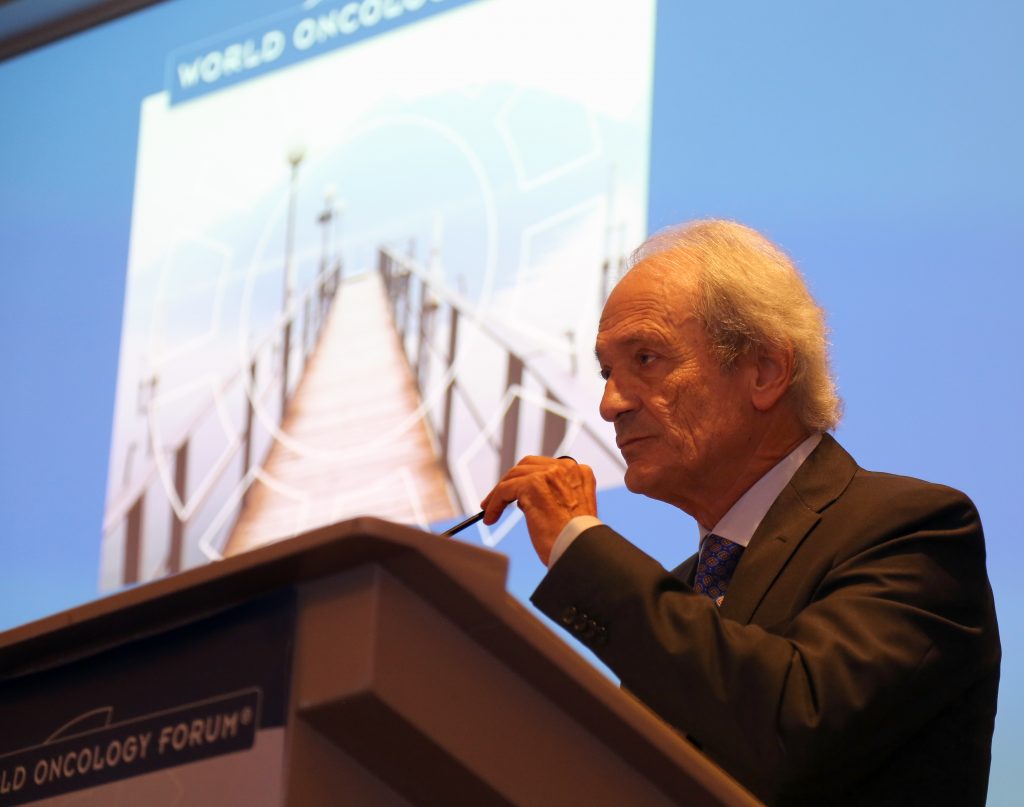
Franco Cavalli, Scientific Director at the Institute of Oncology of Southern Switzerland and the driving force behind the World Oncology Forum points out that global cancer specialists more or less know what to do to combat the disease but finding a way to covert knowledge into action is a challenge.
“What we are mainly lacking is coordination of the efforts to tackle the problem. We know that there is a lack of resources. There is a lack also of a clear vision – how should we envisage this global fight against cancer. There are many papers describing the situation there are many proposals but not one on which everybody could agree, ‘yes, this is what we should do in order to address efficaciously this problem’.”
Mainly he wants to convince policy makers, multinational institutions and national agencies involved in development to put cancer on their agenda.
The third meeting of the World Oncology Forum in Lugano Switzerland (19-21 October 2017) highlighted the cancer challenge in middle and low income countries and focused attention on potential solutions. It exposed fundamental problems in a world where rich countries spend billions to find a drug based solution to cancer while poorer countries struggle to maintain even the most basic services.
The International Agency for Research on Cancer (IARC) is working with countries to establish cancer registries. Freddie Bray says that two in three countries lack high quality surveillance data and only one in five report high quality mortality data to the World Health Organization.
“We must change this because if we don’t have the plan, the compass, the direction of where cancer is going, we are not going to be able to really see if we are making a difference or indeed simply to plan one of the key interventions that are required.”
A global campaign also needs a clear route to action. As Rifat Atun, Director of Global Health Systems at Harvard School of Public Health, put it “Ministers will be interested in ‘what can I do on Monday morning?”
“To get the attention of policy makers for investing in cancer prevention and care you need to make an investment case. You need to demonstrate that there are a number of solutions that can be implemented and we know how. We need to come up with very pragmatic solutions that are feasible in different settings.”
Drug development does not come well out of this challenge. Medical oncologist Tito Fojo points out that the median increase in overall survival for the 91 oncology drugs approved by the FDA between 2002 and 2016 was 2.2 months and that when the latest immunotherapies are included it is still only 2.45 months.
Richard Sullivan, Professor of Cancer Policy and Global Health at Kings College, London, highlights the huge disparity between funding for cancer control in high income countries and what is needed globally. Countries in transition are grappling with double or triple burdens of disease, and the impact of globalisation on risk factors. Yet there is no single point of control of agenda for controlling cancer, and too little emphasis on building leadership and workforces in the countries.
“We have been pretty dismal in support of global cancer actually. Hand on heart look at the amount of money we have transferred into building capacity, training fellows in countries, supporting IARC in delivering cancer registries. They are going around with a begging tin – it is embarrassing, frankly.”
The global campaign against HIV is often seen as the model for establishing political commitment and money – but there are warnings about the need to avoid vertical health programmes in lower income countries and the way that these can divert resources and weaken health systems.
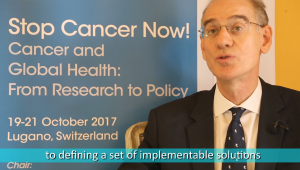
Princess Dina Mired, President Elect of the Union for International Cancer Control (UICC) and a former director of the King Hussein Cancer Foundation in Jordan, believes that international support must build capacity to achieve country priorities. “Many countries in the developing world don’t have the human resource expertise in management how to strategize, how to formulate a customised national cancer control plan.
“What happens when you don’t have a plan is you just get ad hoc achievements; it becomes like a drop in the ocean and there is no impact.
“At the same time support from the global community is also very ad hoc. It does not start with the actual needs of the country even with the best of intentions.”
Robert Yates from Chatham House international think tank says that working with the universal health coverage movement is in our collective interests. “The danger and we have seen it quite often in public health is that we fragment, we go off into our own vertical programmes and really in terms of winning resources from ministries of finance and getting political capital from heads of state, that is a big mistake.”
Following the WOF, ways are being considered to put together the elements of an global campaign for action. Rifat Atun summarises the agenda under seven headings:
- Having a clear narrative demonstrating that there is opportunity for success – and something can be done.
- A broadly based social movement
- Implementable actions to improve infrastructure, capacity and human resources as well as information and data systems.
- A global ambition with local solutions.
- A broad set of stakeholders involved in developing a shared set of priorities to achieve implementable innovations to achieve large scale impact
- Using existing platforms and networks such as Universal Health Coverage, the Sustainable Development Goals and the City Challenge
- A financing instrument, such as a global fund for cancer that is not used to create a vertical programme but to invest in countries to improve efficiency and effectiveness.
A campaign needs people. The HIV movement was largely patient and supporter driven and patients groups have not so far been involved in the World Oncology Forum. There was also a call to involve large companies around the world that are investing huge amounts in occupational health and are increasingly concerned about the impact of cancer on their workforces.
Franco Cavalli is clear that that the Forum needs a set of actionable priorities, not just a general call for more support for cancer. “We have to specify priorities which must be endorsed by an important social movement in order to convince authorities to follow the lines that we are proposing.” The campaign that comes out of this will include calls for universal coverage and for innovation and will be promoted not just within the scientific press but more broadly with the public. Watch this space.



